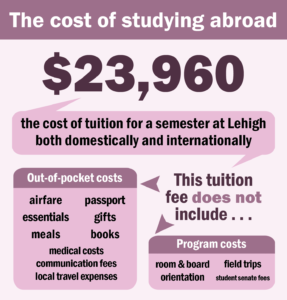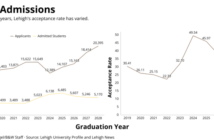
Designed by Kelly McCoy
The cost of a semester at Lehigh is approximately $23,960. Students spending their semesters abroad are required to pay a semester’s worth of tuition to Lehigh, regardless of the program students choose to attend.
“Semester study abroad is the same and can even be cheaper than a semester at Lehigh,” said Katie Radande, the director of Study Abroad.
Katy Rene, the assistant director of study abroad, said one common myth that students and their families have about studying abroad is that it costs more than a semester at Lehigh.
By paying full tuition to Lehigh, students on financial aid are able to apply their financial aid package to their study abroad program. Radande said this allows students to choose their program based on academic and personal interest rather than finances.
“All students pay Lehigh tuition,” Rene said. “Part of that policy is that it allows students to take their financial aid with them.”
Rene said if students paid tuition directly to programs rather than the university, they would be ineligible for federal aid, loans and grants from Lehigh.
Students on financial aid are eligible to have their aid packages re-evaluated before going abroad. Tami Bauder, an assistant director of the Office of Financial Aid, said as a result, some students’ financial aid packages may even increase to help offset the cost of their semester abroad.
This policy is known as the “full tuition policy” and is followed by more than half of the institutions in the United States. By following the full tuition policy, students are able to keep their aid while abroad. Additionally, they are able to study and earn credits to allow them to advance and move forward in their degree at the university.
The tuition does not allocate for additional costs such as program fees.
Program costs include room and board, orientation, field trips and student service fees. Students may encounter out-of-pocket costs like airfare, medical costs, meals, books, essentials, communication fees, gifts and local travel expenses.
Another myth is that students should consider un-enrolling as a full time student to save money while studying abroad.
Although some students might believe it is economical to un-enroll for a semester, this might not be the case. Rene said if students take a “gap semester” and choose to study abroad not as a Lehigh student, the credits they receive during this semester cannot be transferred toward one’s degree at Lehigh.
Bauder said students would also have to reapply for financial aid.
“(If you) take a fall semester off, you have a gap year,” Bauder said. “When you come back, you have to apply to all financial aid deadlines.”
Rene said other institutions allow students to pay their study abroad program directly might institute fees to help pay and maintain basic operating costs of their university.
“There is no doubt there is a lot of money involved,” said Sheryl Hill, the executive director of Depart Smart, an organization that offers tools and information to help students safely return from their trips abroad.
Hill said approximately 2 million students travel abroad in a given year according to the 2014 International Travel Association Outbound Report.
“(The cost of studying abroad) is not a bad thing as long as there is value and there is fair trade,” Hill said. She said there is no consumer protection within the costs of traveling abroad, and it is critical for students to read the fine print before traveling.
Hill stressed the importance of obtaining insurance while abroad. If injured or need to return home as a result of a medical issue, students could face anywhere from $50,000 to $100,000 in expenses. Hill said it is important for students to know their surroundings, program and expenses.
Radande said a semester abroad is more affordable than the winter and summer abroad programs Lehigh offers.
Grants and scholarships are available to students to help fund their study abroad experiences. Exchange partner scholarships can grant students up to $2,000 for enrolling in a partner university.
Radande said the cost of a semester abroad depends on the living expenses students may encounter.





Comment policy
Comments posted to The Brown and White website are reviewed by a moderator before being approved. Incendiary speech or harassing language, including comments targeted at individuals, may be deemed unacceptable and not published. Spam and other soliciting will also be declined.
The Brown and White also reserves the right to not publish entirely anonymous comments.
1 Comment
The important consideration is value. New York is considering the kickback bill because students are being overcharged for their study abroad experiences, and some schools were getting kickbacks from third party program providers.
What if a student does not have financial aid?
In socialist countries, education can be covered by the government, leaving only room and board fees.